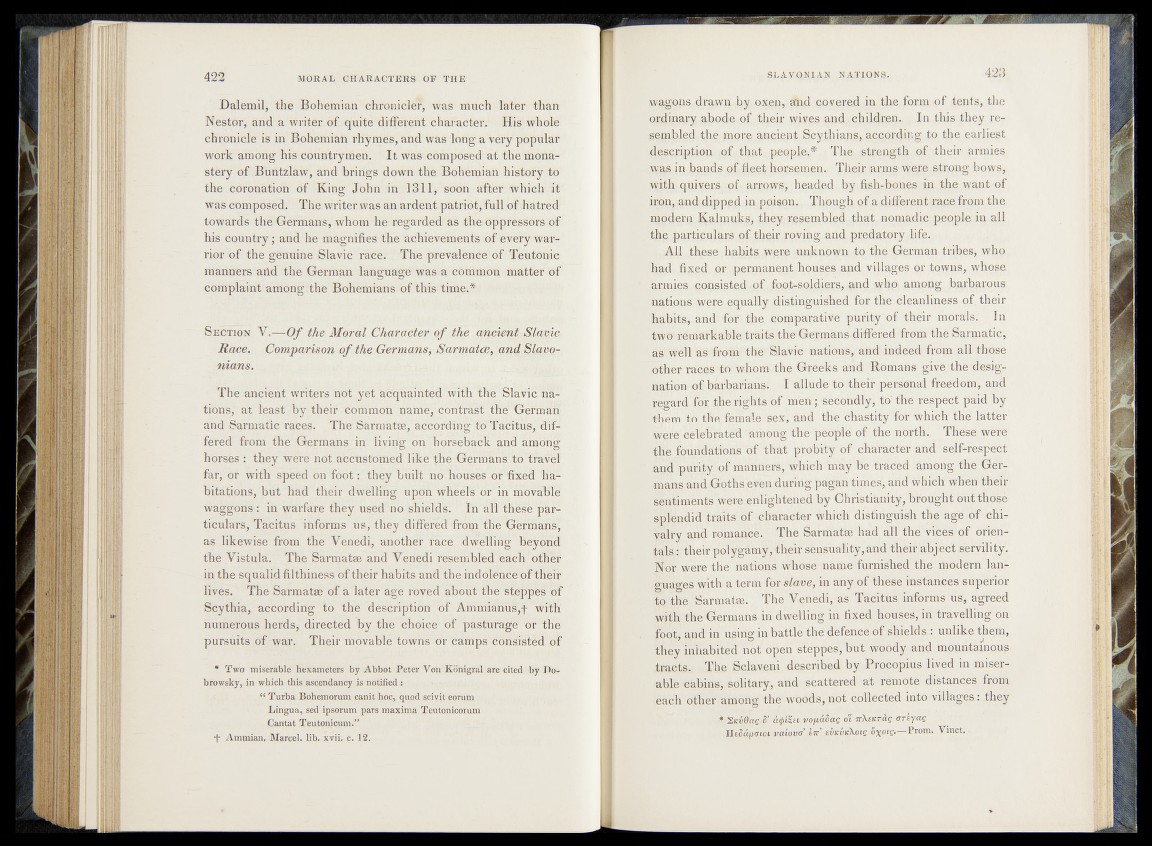
Dalemil, the Bohemian chronicle™ was4 much later than
Nestor, and a writer oLquitedifferent character/ His whole
chronicle is in Bohemian rhymes, and was long a very popular
work among his countrymen;: 11 was-composed at the’monastery
of Buatzlaw, and brings down the Bohemian history to
the coronation of King John in 1311, so tin a fte rw h ic h it
was composed. The writer.was an ardent patriot, full of hatred
towards the Germans, whom he regarded as the oppressors of
his country; and he magnifiesthe achievements :iof every war-
rior of the genuine Slavic race. The prevalence of Teutonic
manners and theGerrnmi langua^e' was ra common matter of
complaint among., the Bohemians of this time.* I
■Section V . -— O f t h e M o r a l C h a r a c t e r o f t h e a n c i e ^ f S sl a ^ ip?
Race. Comparisonofthe Germans, Sarmatce, and ^l/aponians.
&
The ÉnCtent writers not yet acquainted with tn^SIaVic nations,
at least by their common name/cSDW^sf^tne Gérriïarr
and Sarmatic races. The Saramtse, according ;tb TaCit^f differed
from the Germans in living on horseback and aindng
horses : they tveré not accustomed like 0 e Geriqans%oTravel
far, Or with speed on fo o t: they built no houses 'bfyhxea lia-
bitatibns, but had their dwelBngyopon whhëfPmr m movable
waggons: in warfare they used “no .shields.' In all thefemar-
tièulars, Tacitus informs us, they differed from the tSermans,
as likewise from the Vanêcü, another race* dwelling -Beyond
the Vistula. The Sarmatae and Venedi rëSembled ehélr other
in the squalid filthiness of their habits and the indolence"of their
livès. The Sarmatae of a later'age roved about the steppes of
Scythia, according to the description óf Ammianus,f with
numerons herds, directed by the choice- of pasturage or the
pursuits of-war. Their movable towns or camps conëïistéd of
* Two miserable hexameters by Abbot Peter Vori Köndgral are cited by Doll
rowsky, in which this ascendancy is notified :
jc'* *fTurba Bohemortjm canit hóe, quodeciyjt eorum
Lingua, sed ipsorum pars maxima.Hfiutonicorum
Canrtat Teutonicum.”
•j- Ammian. Marcel, lib. xvii. c. 12.
m ^ 9ps, dj’fwp ^ld-.cpyqred in the form of tents, the
ordinary abode, p£ their wiyp&#nd,«chüdrem In this they re-
sprpbledj'thje, jqpre a n p i^ n fy th ja p s , acpqrd&g’, f° the earliest
jdqs;c,riptjon ;pf? tlyat. ple.# The strength of their armies
vf^s in bmi4^pf,d$e|j?JmP^m£n--/T.bpfr m’ms w.epe strong bows,
v\|ith quivers of .pg^w s ., headed by fish-bones in the want of
irqn,,and,dipped in-poison,. Thpugh pf.a^fferent ^ace from the
m â f|g iK a liiiu h |, 0 ew r^serobjy^d^that nomadic people in all
th e ’partipujars^pl^thei^rpyi^g^and predatory life. •
^ ^ l lM0 ese0 abits, ^qr^'ïup^now-n^tOjthe Gasman tribes, whey
had, permanejût^9^jess>a,nd v|Jlt^gps or towns, whogg,
armies çopsisit^d»of and wl}p. among barbarous
•nations'Were e q u a |^ |ïistingWshed.for the' cleanliness of, their
habits, àtid^fèr the comparative purity'of ltheir morals/ In
t tvb‘ 'r-d mark able traits tb^Ge,rm,aiis/di#ered from the Sarmatic1,
a&'Well as from -the/Slavic nations]- and1 indeed-from all those
f i l e r Taees to-whom the Grëéks add Romans' give the designation
of barbarians. , I -allude to their ^personal freedom, and
regard fo t0 e,rignts>W to* the res'pect paid by
them ito me fémàle' sex, and the chastely'for which the* latter
were■ eéliiiratód ' among th-e people' of the nbrth.' ^ These were
the foundations of that - probity of’character and ’ self-fespeèt
'and purityppf -manners, which may be traced among the Germans
and Gothsçvcn during pagan times] and which when their
sëntim'êMs were enlightened by Christianityjbrought out those
spïënàid traits of character \Vhicli distinguish the'age of'/ch»
valry and romancer The Sarmatae had'all the’ vicès of orientals
r'thefr polygamy, their sep'suafit-y,and their abject servility.
Nor were the nations whose name furnishedHhe modem fab?
.gauges with a term for slave, in any of thèse1 instances superior
to the Sarmatae. The Venedi, as Tacitus informs us, agreed
wi th thcGermans in dwelling in fixed houses,'in travelling on
.foot, and in using in battle the defence of shields : unlike them,
tliey inhabited not* ópen steppes, but woody .and mountainous
Jtpaets. described by Procopius lived in miserable
cabins, solitary, and scattered at remote distances from
each other'amorig the'woods,-iïbt collected into villages :,they
A ’SkvQciç.S’ àffêu v.o/Jtôêaç oï xXeKrfiç arsyaç
TS.tUtipG.toi w aLoua l i t ’ bvkvk\ oiqS>xoiç.—Prom. Yinet. - -